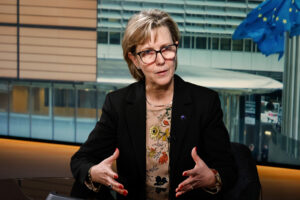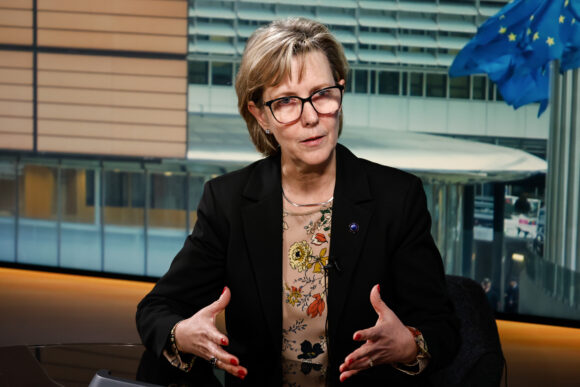A group of investors representing €6.6 trillion ($6.8 trillion) of assets is calling on European officials not to cave in to mounting pressure to scale back the bloc’s ESG regulations.
The planned reporting rules are essential to help asset managers and owners identify where to allocate funds, according to the group, which consists of the Institutional Investors Group on Climate Change (IIGCC), the European Sustainable Investment Forum (Eurosif) and the Principles for Responsible Investment (PRI).
Any adjustments should be limited to technical standards and guidance on implementation, the group said on Tuesday. The alternative, namely reopening European environmental, social and governance requirements “in their entirety, risks creating regulatory uncertainty and could ultimately jeopardize” Europe’s goal of living up to its Green Deal, which is enshrined in law, the joint statement said.
Corporate ‘Irritation’ Over ESG Fueled by Significant Costs
The warning coincides with mounting pressure from Germany and France, the European Union’s two largest economies, to scale back planned ESG regulations on concerns the requirements are preventing companies in the bloc from competing freely with their peers in the US and Asia.
France called last month for a “massive” regulatory pause and urged EU officials to ensure that small and mid-sized companies aren’t unduly burdened by reporting rules. Germany wants the EU to delay the requirements, known as the Corporate Sustainability Reporting Directive, by two years and to water down several details.
French and German demands for a regulatory timeout come as both countries watch their output decline. Official figures published last month show that neither economy saw its gross domestic product increase in the final months of 2024, dragging down growth in the entire euro zone.
Describing their plea as an intervention, IIGCC, Eurosif and PRI said they’ve shared their concerns with EU Commission President Ursula von der Leyen and other “key” commissioners, to make sure investors operating in the bloc have “timely access to high-quality and comparable reporting” from companies, describing such data as “a prerequisite to inform and guide” investor decisions.
The lack of standardized, audited information has been an obstacle that investors have had to contend with for years. Pleas for reform led the EU to rewrite its rules for reporting non-financial information, including the introduction of CSRD.
In a separate statement, the European Banking Federation said it supports simplification. However, it urged the EU not to reduce the number of companies that must report under CSRD, citing the industry’s own requirements to report on ESG risks.
The EU has included a number of ESG regulations in its so-called omnibus process, which is expected to take place at the end of this month. The goal is to explore ways to simultaneously simplify multiple laws.

In a recent interview, the EU’s new commissioner for financial services, Maria Luis Albuquerque, said the bloc remains committed to its landmark Green Deal. However, corners of the regulatory and legislative rollout probably need to be fine-tuned, she said.
It’s about “adjusting the pace,” while “maintaining the anchor,” she said.
Alexander Burr, ESG policy lead at Legal and General Investment Management, said that rolling back the rules “could risk our ability to understand ESG or sustainability-related risks.”
EU officials are due to meet with business leaders and trade organizations this week to discuss possible changes to ESG rules. But that meeting won’t include sustainable investors, a decision Burr calls “unfortunate.”
“If you’re going to trial something, you really want to have feedback from across the market and have opportunity to provide feedback,” he said in an interview.
What Bloomberg Intelligence Says:
The total administrative costs for all companies within the scope of CSRD are €2.1 billion in one-off costs and €2.4 billion in recurring costs. NFRD-listed entities are likely to face, on average, a total of €287,000 as a one-off cost of reporting and about €320,000 on annual basis. Non-NFRD, non-listed undertakings incur the lowest administrative costs, primarily due to their smaller average size — about €36,000 on a one-off basis and €40,000 on a recurring basis. NFRD-listed entities incur the lowest administrative costs as a share of turnover.
Aside from CSRD, the EU will use the omnibus process to consider changes to the bloc’s Taxonomy Regulation and the Corporate Sustainability Due Diligence Directive, which looks at companies’ supply chains.
“We’re at a decisive turning point for sustainable finance,” Philippe Zaouati, chief executive of Mirova, said in the statement. “While climate concerns are often sidelined in the face of geopolitical and economic crises, it is imperative that we remain committed to our sustainability goals.
Topics Europe
Was this article valuable?
Here are more articles you may enjoy.



 Experian Launches Insurance Marketplace App on ChatGPT
Experian Launches Insurance Marketplace App on ChatGPT  Fingerprints, Background Checks for Florida Insurance Execs, Directors, Stockholders?
Fingerprints, Background Checks for Florida Insurance Execs, Directors, Stockholders?  ‘Structural Shift’ Occurring in California Surplus Lines
‘Structural Shift’ Occurring in California Surplus Lines  Florida Insurance Costs 14.5% Lower Than Without Reforms, Report Finds
Florida Insurance Costs 14.5% Lower Than Without Reforms, Report Finds 

